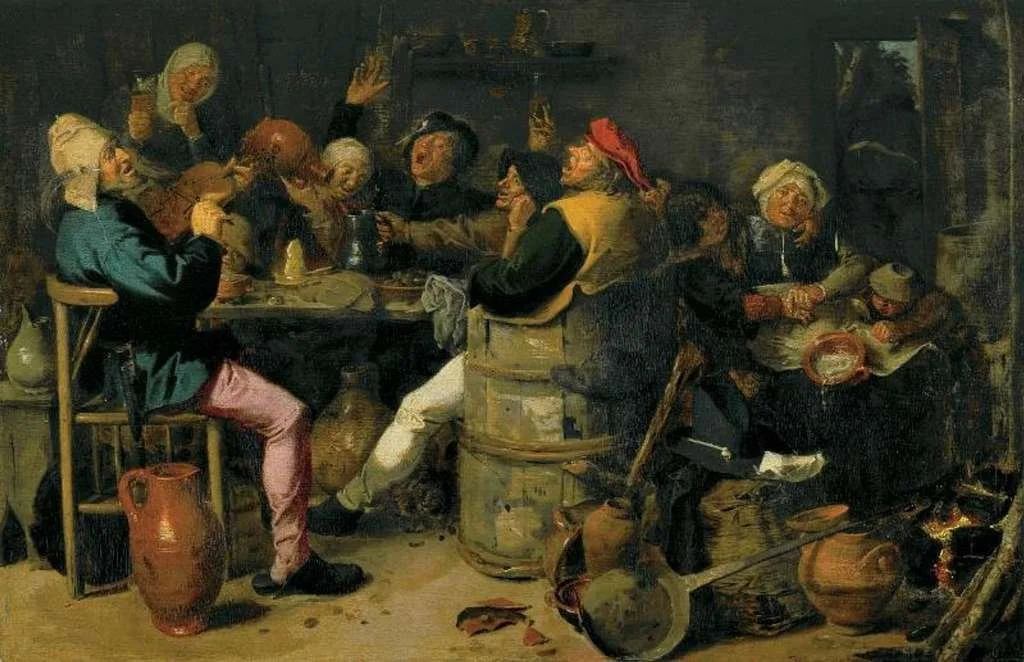Just what downtown SJ doesn't need: more drunk people on the street at 4:00AM
Adriaen Brouwer: Peasant feast, 1638. Image by Kunsthaus Zürich
State bill would allow struggling downtowns to establish “Hospitality Zones” to extend Last Call on weekends and holidays. Matt Haney's (D17-San Francisco) office explains.
The Chair of the Downtown Recovery Select Committee, Matt Haney has introduced legislation that authorizes cities to create “Hospitality Zones” where they can opt-in to extend “last call” times for specific, permitted venues to 4 a.m. on Fridays, Saturdays and official state holidays.
“Downtowns in California are still struggling to return to pre-pandemic levels almost half a decade later,” said Haney. “As Chair of the Assembly Select Committee on Downtown Recovery, I've heard from cities all over the state that are begging for the flexibility to attract people during evening, night and weekend hours,” said Assemblymember Haney. “Tourists, downtown residents and convention planners are all looking for cities with both vibrant daytime and nighttime economies. Unfortunately many California downtowns become ghost towns after 5 p.m. A thriving nightlife has extensive positive effects on many other sectors, including retail, the arts, restaurants, housing, and large conventions, and will bring more people into downtowns that desperately need them during both the day and night.”
The one-size-fits-all, top-down “last call” law in California has limited the ability of cities to attract visitors and tourists and hamstrung businesses who rely on limited nighttime hours to survive. As some of the “happy hour” revenue from office workers downtown has declined, California’s nightlife economy has found itself under even greater threat to survive. Over a dozen other states, including many that compete with California for tourists, conventions and large events, including Nevada, Florida, New York and Illinois, already allow for their cities to determine their own, later “last call” hours.
In recent years, California has experienced a decline in hosting large conventions, with many events relocating to other nearby states like Colorado and Nevada. Conventions have the potential to generate close to $587 million, making their relocation a devastating setback to local economies. Other types of tourism spending also remain far behind pre-pandemic levels. In the Bay Area hotel revenue remains down by 45% and restaurant revenue is still 20% less than in 2019.
“You definitely don't have to be a person who goes out until 3am to understand that it can be something that can help our cities and our state. Even for those of us who prefer to be in bed by 10 p.m., we will benefit from giving our struggling downtowns the tools they need to recover economically and attract tourists, large conventions, and new residents. A thriving night time economy is a win-win and has massive positive effects for restaurants, hotels, cafes, and retail stores, even those that close much earlier,” said Assemblymember Haney.
California’s famous music festivals and entertainment events are also struggling with festivals, like Coachella which generate more than $700 million for the local economy, struggling to sell tickets. Consumers are no longer satisfied with paying hundreds of dollars for isolated events. If they are spending a lot of money they want an experience outside of the event where they can enjoy the local culture.
As the state prepares to host five major worldwide events over the next three years, our cities need every tool to be able to capitalize on this moment, especially for our state's hospitality sector small businesses. The 2025 Super Bowl generated $1 billion for the New Orleans economy, a city known worldwide for its thriving nightlife. As San Francisco and the nearby cities prepare to host the 2026 Super Bowl, followed by the 2027 Super Bowl in Los Angeles, a limited last call hour will greatly limit opportunities for businesses, discourage tourists from traveling to our state, and create challenges for managing a large number of visitors.
Additionally, California will be hosting international travelers as one of the hosts of the World Cup in 2026 and the host of the Olympics in 2028. When deciding whether the expenses of these events are worth their money, tourists will take into account the entertainment options that could accompany their visit to California for these events. There will also be huge opportunities for California’s small businesses and workers that require flexibility and adaptability based on demand.
Currently only one venue in California is authorized to have a later last call–the Intuit Dome in Los Angeles, home of the LA Clippers–after Governor Newsom signed a bill into law allowing for it last year. All other venues, big and small, in every city are currently prohibited by the state from having a last call later than 2am.
Read the whole thing here.
Follow Opportunity Now on Twitter @svopportunity
We prize letters from our thoughtful readers. Typed on a Smith Corona. Written in longhand on fine stationery. Scribbled on a napkin. Hey, even composed on email. Feel free to send your comments to us at opportunitynowsv@gmail.com or (snail mail) 1590 Calaveras Ave., SJ, CA 95126. Remember to be thoughtful and polite. We will post letters on an irregular basis on the main Opp Now site.

